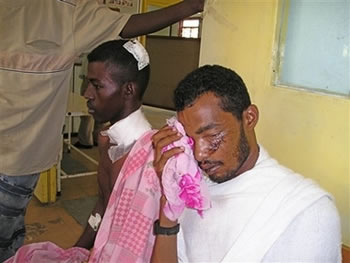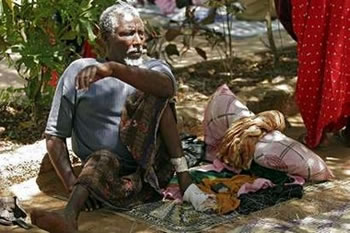 |
|
Two men got wounded during indiscriminate shelling in Mogadishu - It is time the world should take action by what is going on in Somalia - (AP Photo/Mohamed Sheikh Nor) |
Abdirizak Omar Mohamed
Monday, April 02, 2007
In late March we have witnessed an unprecedented loss of lives, destruction of properties and hundred of thousands of displaced people, the Mogadishu hospitals are full to their capacity and are not equipped to treat with some of the most critical injuries due to lack of medication. It is unfortunate that the international community has failed to react to this genocide in Mogadishu. This could not have happened without the blind support the Ethiopians got from the USA and the TFG.
Let us now analyze whether the actions of Ethiopia and the TFG leadership constitute war crimes and whether their actions justify processing war crimes in the international court of law in Hague against members of the TFG. Moreover, within this context there are also individual countries that
allow citizen to file war crimes against individuals who were members of a government or institutions that committed atrocities against ethnic groups, and Canada has the War crimes act in 2000. For example the Canadian war crimes Act is intended to deal with the three crimes of Genocide, Crimes against Humanity and War crimes with an emphasis on the law which has developed around the concepts of crimes against humanity and complicity. In this context the Toronto Star’s Thomas Walkom wrote in a 2004 editorial that Canada should indict Bush for crimes against humanity because Canada's war crimes law specifically permits prosecution not only of those who carry out such crimes but of the military and political superiors who allow them to happen. This law clearly allows us to indict individual Somali Canadian MPs who have participated in the commission of these atrocities or were complicit about it.
The rules of engagement clearly state that civilian lives be spared. The International law uses the Term “Wanton destruction” meaning an attacker must, under the laws of war, distinguish between military targets and civilians and their property. Should he not do so, he is guilty of the war crime of indiscriminate attack. If that attack results in "extensive, willful and unnecessary damage", he is then guilty of wanton destruction. This is consistent with both the actions and statements made by the president of the TFG Abdullahi Yusuf, the PM Mr. Gedi and Deputy of the Defense Mr.salad Jeele et al in the TFG. Here it should be noted that there was a “Willful” intent on the statements made by the president, prime Minister and the depute minister of defense to pillage the Mogadishu city
 |
Abdullahi Ahmed Gedi sits with a bandage around his feet at Madina hospital yard in Mogadishu, March 31, 2007, after he was wounded by a mortar bomb during fighting of government troops, backed by Ethiopian forces
REUTERS/Sahal Abdule (SOMALIA) |
Even if one examines the 1907 and the 1949 Geneva conventions they both state that pillage of cities constitute war crimes, it explicitly states that “The pillage of a town or place, even when taken by assault is prohibited.". The fact that the Ethiopians and TFG have taken over and destroyed the Hayat hospital, the Bakarah market and many properties justify that pillaging has indeed taken place and it should be dealt accordingly and perpetrators indicted for war crimes.
What about if these individuals were to argue in their defense that the conflict in Somalia was a civil war and they should not be held accountable, well, the International Court of Justice holds that a foreign state is responsible for the conduct of a faction in a civil war if that faction is a de facto agent of the said state and this should implicate Ethiopia and the TFG. Similarly, there are other surprising precedents such as the case in Rwanda civil war, where the civil war argument was thrown out in sentencing those who participated in the Rwanda genocide.
All in all, it is important that all evidences are archived; these include statements, documents and circumstantial evidence for processing the indictments and filing them in the international war crimes tribunal in Hague as well as in the courts in individual countries for potential prosecution of individuals who participated in the genocide in Mogadishu, Somalia.
Abdirizak Omar Mohamed
Toronto, Canada
Email [email protected]